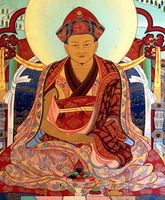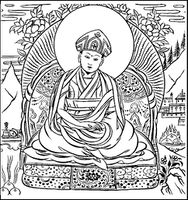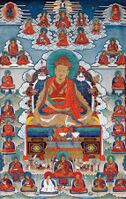The Fourth Shechen Gyaltsap Gyurme Pema Namgyal
Zhechen Gyaltsab, 4th
| PersonType | Category:Classical Tibetan Authors Category:Tulkus |
|---|---|
| MainNamePhon | The Fourth Shechen Gyaltsap Gyurme Pema Namgyal |
| MainNameTib | ཞེ་ཆེན་རྒྱལ་ཚབ་༠༤་འགྱུར་མེད་པདྨ་རྣམ་རྒྱལ་ |
| MainNameWylie | zhe chen rgyal tshab 04 'gyur med pad+ma rnam rgyal |
| MainNameSkt | Padma Vijaya |
| AltNamesTib | ཨོ་རྒྱན་མི་འགྱུར་ཀུན་བཟང་བསྟན་པའི་རྒྱལ་མཚན་ |
| AltNamesWylie | o rgyan mi 'gyur kun bzang bstan pa'i rgyal mtshan |
| YearBirth | 1871 |
| YearDeath | 1926 |
| TibDateGender | Female |
| TibDateElement | Iron |
| TibDateAnimal | Sheep |
| TibDateRabjung | 15 |
| ReligiousAffiliation | Nyingma |
| EmanationOf | Shechen Gyaltsab Orgyen Rangjung Dorje |
| StudentOf | Mipam Gyatso · Jamyang Khyentse Wangpo · Jamgön Kongtrul Lodrö Taye · Kunzang Palden · Khenchen Tashi Özer · dge mang mkhan chen yon tan rgya mtsho · pad+ma badz+ra · Patrul Rinpoche · pad+ma theg mchog bstan pa'i rgyal mtshan |
| TeacherOf | Jamgön Kongtrul Khyentse Özer · Jamyang Khyentse Chökyi Lodrö · Dilgo Khyentse Tashi Paljor |
| BDRC | https://www.tbrc.org/#!rid=P235 |
| Treasury of Lives | http://www.treasuryoflives.org/biographies/view/The-Fourth-Shechen-Gyeltsab,-Pema-Namgyel/P235 |
| IsInGyatsa | No |
| BnwShortPersonBio | Shechen Gyaltsap Gyurme Pema Namgyal, a remarkable master who lived at the end of the nineteenth and the beginning o f the twentieth century, wrote The Great Medicine that Conquers Clinging to the Notion of Reality. He was a disciple of the greatest luminaries of the nineteenth century, including Jamyang Khyentse Wangpo, Jamgön Kongtrul Lodrö Thaye, and Lama Mipham Rinpoche. Shechen Gyaltsap was indisputably one of the most learned and accomplished lamas of his time. The thirteen volumes of his large collection of writings contain many lucid and profound commentaries on various aspects of philosophy and practice.
Shechen Gyaltsap was also an accomplished practitioner. He spent much of his life in retreat above Shechen Monastery in eastern Tibet, and achieved many signs of accomplishment. Once he started a three-year retreat based on the Vajrakilaya practice, but to everyone's surprise after only three months he emerged saying that he had completed his intended program. The next morning, his attendant noticed an imprint of his footprint on the stone threshold of the hermitage. Shechen Gyaltsap's disciples later removed the stone and hid it during the Cultural Revolution. Today, it is possible to see it at Shechen Monastery in Tibet. The imprint was an outer sign of his inner realization of the Vajrakilaya practice. (Source: The Great Medicine, introduction, 21) |
| Other wikis |
If the page does not yet exist on the remote wiki, you can paste the tag |



